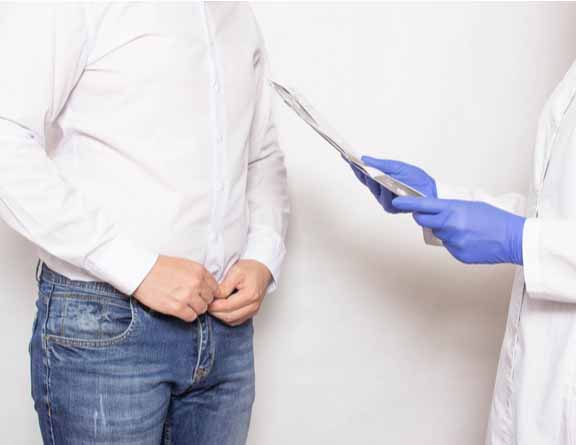
Chennai
USFDA-Approved Procedure
Support in Insurance Claim
No-Cost EMI
1-day Hospitalization


Enlarged Prostate Treatment in Chennai
The diagnosis for an enlarged prostate involves a combination of physical examination and diagnostic tests to confirm BPH. Since heredity is a risk factor for BPH, the doctor will analyze your family history report. The doctor recommends the following tests to rule out the possibility of enlarged prostate due to other conditions. Some of the diagnostic tests include –
In case of moderate or complex cases, the doctor may recommend the following diagnostic tests –
Medicine for Prostate Enlargement- Doctors generally prescribe medications to treat men with mild to moderate symptoms of BPH. These medicines ease the symptoms by calming the muscles in the prostate and bladder. However, there may be some side effects related to corresponding medications depending on the condition and severity of the disease. Some categories of medications prescribed by the doctor for BPH include-
There are several surgical as well as non-surgical methods for BPH treatment which include various medications, dietary changes, and lifestyle modifications. However, non-surgical methods such as medications, home remedies, etc are effective to manage the symptoms of BPH and surgical treatment is the only method to treat enlarged prostate.
Minimally invasive surgeries – These surgical techniques involve minimal invasion that can often be done as outpatient surgery, meaning the patient may not require a hospital stay. Recovery is generally quicker, but it depends on the medical condition of the patient and the surgical expertise of the surgeon. Minimally invasive techniques such as TURP, TUIP, etc., help the patients relieve symptoms quickly and may nullify the need for medications. Minimally invasive procedures are recommended in case of the following situations-
Based on these conditions, there are different techniques to perform minimally invasive procedures-
You can visit our best Prostate Surgeons in Chennai and nearby cities such as Mumbai, Pune, Hyderabad and Bangalore.

No 16 & 50, River View Colony, Block Z, 3rd Street, Anna Nagar, Chennai, Tamil Nadu 600040

No 128, 1st Main Road, D Block, Kilpauk Garden Road, Annanagar, Chennai, Tamil Nadu 600102
Delivering Seamless Surgical Experience in India
Your safety is taken care of by thermal screening, social distancing, sanitized clinics and hospital rooms, sterilized surgical equipment and mandatory PPE kits during surgery.
A dedicated Care Coordinator assists you throughout the surgery journey from insurance paperwork, to free commute from home to hospital & back and admission-discharge process at the hospital.
Our surgeons spend a lot of time with you to diagnose your condition. You are assisted in all pre-surgery medical diagnostics. We offer advanced laser and laparoscopic surgical treatment. Our procedures are USFDA approved.
We offer free follow-up consultations and instructions including dietary tips as well as exercises to every patient to ensure they have a smooth recovery to their daily routines.
BPH is defined as benign prostate hyperplasia referring to the enlargement of the prostate gland due to several factors such as aging which usually occurs in men over 50 years. Prostate cancer is the abnormal cell growth around the prostate gland that can spread to other parts of the body.
The term ‘benign’ in benign prostate hyperplasia (BPH) indicates that the condition is not cancerous. However, other conditions can trigger abnormal cell growth in the prostate resulting in prostate cancer.
Benign prostate hyperplasia can worsen with age leading to improper emptying of the urinary bladder. This can result in UTIs, bladder damage, and blood in urine, and in some cases, even kidney damage.
Prostatitis refers to the inflammation of the prostate due to traumatic injury to the prostate or due to the bacteria that entered the prostate from urine or during sex. Benign prostate hyperplasia refers to the enlargement of the prostate gland that squeezes the urethra, making it hard to empty the bladder completely.
The cost of the BPH procedure in Chennai can range anywhere between Rs. 60,000 to Rs. 1.5 lakhs.
The cost of Transurethral resection of the prostate (TURP) is around Rs. 60,000 to 1 lakh (approx).,The cost of laser procedure (HOLEP) is around Rs. 1 lakhs – 1.5 lakhs (approx).
However, this is a general cost and can vary depending on several factors such as the severity of the condition, the medical condition of the patient, and the surgical expertise of the surgeon.
The standard duration of surgery for different BPH procedures are as follows –
However, the standard OT time depends on the medical condition of the patient and the surgical expertise of the surgeon.
TURP is a minimally invasive technique that is considered very effective for the treatment of BPH. However, like any other surgery, there may be some complications that usually depend on the medical condition of the patient and the surgical expertise of the surgeon. Possible complications of TURP include –
Incontinence,Improper fluid absorption,Abnormal bleeding during the surgery, which may require a transfusion,Erectile dysfunction,Urethral stricture that can lead to a ‘split stream’ of urine
Usually, patients are discharged within 1-2 days after the surgery. Patients may still have a catheter inside their bladder to aid them in urination. It also keeps the urethra open during the initial healing process for a few days following these treatments. Doctors at Pristyn Care will provide comprehensive post-treatment instructions and explain the recovery period to you.
Transurethral incision of the prostate (TUIP) is usually considered for mild cases of BPH and the probability of complication is very bleak. However, like any other surgery, there are chances of complications based on the health of the patient and the surgical experience of the surgeon. Possible complications of TUIP are –
Retrograde ejaculation (when semen flows into the bladder),Abnormal bleeding during surgery,Infection around the surgical site,Incontinence
Possible complications of open prostatectomy are-
Infertility,Impotence,Overactive bladder,Infection,Partial or full incontinence,Leaking of urine when feeling the urge to urinate
Although BPH is not a life-threatening condition, it can be very inconvenient. Most men over the age of 40 have some degree of asymptomatic prostate enlargement. As such, it is only diagnosed in men who are exhibiting symptoms of prostate enlargement. It disrupts a person’s daily life in several ways:
As the large prostate size blocks the urethra, it blocks the passage of semen as well. Moreover, the prostate is responsible for the formation of seminal enzymes, which is impacted in BPH. Therefore, BPH can cause infertility as well.
BPH causes prostate gland enlargement which directly blocks the urinary passage by compressing the urethra. Common urinary symptoms observed in BPH are:
Patients are asked to avoid sex for 2-3 weeks after the surgery as they are still in recovery. However, this time is not set in stone and they can start having sex after getting approval from their surgeon.
In the initial stages, BPH symptoms can be mitigated via medical management. However, as the prostate size enlarges, surgery becomes inevitable for long-term relief.
Men with enlarged prostates should limit their alcohol consumption. As a diuretic, alcohol promotes urine formation but it hinders the ability of muscles to relax, causing patients increased difficulty in urinating. It can even trigger complete blockage of the urinary tract. Hence patients can consume small amounts of alcohol but in larger quantities, it may be harmful.
Herbal teas such as green tea and hibiscus tea are very beneficial for prostate health as they are very rich in antioxidants. Certain research studies have even shown that they can slow down prostate growth and prostate cancer.
Prostate surgery is carried out under anaesthesia so patients generally do not notice any pain. There may be mild pain and discomfort after the surgery due to bladder spasms or urethral inflammation due to the catheter, but these are temporary and disappear a little while after the catheter is removed.
Although it is not definitely proven that sitting still can cause prostate issues, some research studies have found a correlation between a sedentary lifestyle and increased PSA levels. Additionally, exercise and a healthy lifestyle directly benefit prostate health.
Prostate glands form essential enzymes and hormones present in the seminal fluid that help with sperm function and motility. Thus, a healthy prostate gland is necessary for fertility.
Though most patients need to undergo surgery for an enlarged prostate gland, size is not the only factor to be considered when it comes to surgery. Your surgeon will compare your prostate size to your symptoms before making a decision about the surgery. You may have to undergo surgery even with a mildly enlarged prostate gland if your symptoms are severe.
There are two types of prostatectomy surgeries and they are:
Radical prostatectomy where the surgeon removes the entire prostate gland along with the surrounding tissues. It is usually performed in three different ways such as laparoscopic approach, robotic approach and open approach.,Open simple prostatectomy is where the surgeon only removes the problematic part of your prostate rather than the entire gland.
Benign prostate hyperplasia is very common in men above the age of 40 due to increased testosterone levels. It is characterised by high PSA levels and prostate growth in the centre. However, in prostate cancer, the growth occurs in the margins of the prostate gland and leads to an increase in both PSA and alkaline phosphatase levels. Also, unlike BPH, prostate cancer can metastasize and spread to other parts of the body.
Just as some foods benefit prostate health, certain foods can damage prostate health. Foods that can negatively affect the prostate gland include:
An enlarged prostate gland, or prostatomegaly, is a benign disorder but it can negatively impact the lifestyle in many ways:
If you notice any of these warning signs then you may have prostate disease. Get in touch with the best urologists in Chennai through Pristyn Care for the best prostate treatment near you.
Since prostate enlargement is such a common disorder in men, it is very important to maintain a nutritious diet that can help mitigate prostate disease. Some nutrients that benefit prostate health are:
Pristyn Care is the leading provider of BPH treatment in Chennai. It is associated with the best urology hospitals in Chennai and has the best urologists on its panel. Facilities provided by Pristyn Care for all BPH patients are:
Surgical procedures for BPH can be a strange experience for people. Surgeries can be stressful for the patient, but if the patient knows what to expect, it becomes easier for them emotionally and mentally. Here are some tips that can help you prepare for the surgery –
You can also book an appointment through our Pristyn Care app. Our team of medical coordinators will arrange an offline or online video consultation from doctors near your area, charging a nominal consultation fee.
Ameya Pujari
Recommends
Pristyn Care's management of my prostate enlargement was outstanding. The urologists were highly knowledgeable and recommended appropriate treatments. They took the time to address my concerns and provided ongoing support. Thanks to Pristyn Care, I now experience fewer symptoms and improved quality of life.
Ankita Roy
Recommends
Pristyn Care supported our process of consultation and hospitalization very seamlessly. Starting from selecting the best doctor and helping us choose the hospital as per our requirement. I would like to thank Ms. Anuragi from Pristyn Care, who made sure everything fell in place. My dad’s surgery for the enlarged prostate gland was done with utmost perfection. Extremely happy to have found a medical assistance like Pristyn Care. Would highly recommend everyone to choose Pristyn Care for a smoother medical experience.
.svg)
.svg)
.svg)